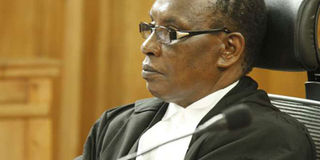Ali-Aroni first to face panel as DCJ interviews begin tomorrow

Judge Roselyn Nambuye at the Supreme Court during the ruling of a case on digital migration on March 28, 2014. She is one of the candidates for the Deputy Chief Justice position. PHOTO | JEFF ANGOTE | NATION MEDIA GROUP
What you need to know:
- The first DCJ Nancy Baraza was forced out for allegedly assaulting a security guard, Rebecca Kerubo, at Nairobi’s Village Market mall.
- Court of Appeal Judge Agnes Murgor, 53, is yet another Judiciary insider who stands a good chance.
The Judicial Service Commission (JSC) will begin the next phase of filling the three vacant Supreme Court positions from Monday when they start interviewing the applicants for the Deputy Chief Justice (DCJ) to succeed Justice Kalpana Rawal, who retired in June under controversial circumstances.
There are 16 applicants for the DCJ position. Besides the judicial functions as a member of the Supreme Court bench, the DCJ is also the deputy head of the Judiciary and vice-president of the apex court.
The position has, however, attracted a lot of controversy since it was created in the 2010 Constitution.
The first DCJ Nancy Baraza was forced out for allegedly assaulting a security guard, Rebecca Kerubo, at Nairobi’s Village Market mall.
She resigned in October 2012 while under suspension. In came Justice Rawal, whose run-ins with the JSC and unsuccessful legal challenges seeking to retire at the age of 74 years instead of 70 years made headlines.
Together with Supreme Court judge Philip Tunoi, they had contested JSC’s decision to retire them, an issue that split the Supreme Court.
JSC insiders told Sunday Nation that they are trying to avoid a similar occurrence that will drag the judiciary’s name in the mud.
“There is a possibility that the JSC may opt for a candidate who was appointed after the 2010 Constitution. JSC is also looking for a versatile person with good administrative skills who can comfortably step into the place of the CJ,” the JSC insider, who spoke in confidence, said.
Such considerations may not augur well for a number of candidates, more so those who were in the Judiciary before the 2010 Constitution.
The appointment of the DCJ could also be determined to a large extent by JSC’s nomination of Justice David Maraga as the Chief Justice in terms of gender and ethnic background.
According to the revised schedule of interviews for CJ, DCJ and Supreme Court judge, the first person to face the JSC will be High Court Judge Abida Ali-Aroni.
She served as the vice-chairperson of the Constitution of Kenya Review Commission (CKRC).
After CKRC chairman Yash Pal Ghai resigned from the commission, she became the chair of the commission that came up with the famous Bomas draft constitution which the Executive mutilated and was renamed the Kilifi draft.
LIKELY CANDIDATES
She was appointed a High Court judge in April 2009, the position she still holds.
But Justice Ali-Aroni was among those the Judges and Magistrates Vetting Board (JMVB) chaired by Sharad Rao found unsuitable to continue serving.
She, however, appealed her sentence and was reinstated in October 2014.
Court of Appeal Judge Agnes Murgor, 53, is yet another Judiciary insider who stands a good chance.
She is the wife of the former Director of Public Prosecutions Philip Murgor and was appointed to the judiciary in December 2012.
Justice Murgor sits in the Judiciary Performance Management and Measurement Steering Committee which was set up by then CJ Willy Mutunga to gauge the performance of the judicial officers.
The former Group Company Secretary of the East African Breweries (EABL) is also a member of the Court of Appeal Strategic Plan Committee.
Before her judicial appointment in 2012, she was a board member of the Privatisation Commission and had also worked as a State Counsel in the State Law Office besides her private practice at Murgor & Murgor Advocates, as well as Hamilton Harrison & Matthews Advocates.
Next in line is another Court of Appeal judge Fatuma Sichale who is known for her time as a deputy director of the defunct Kenya Anti-Corruption Commission (KACC), now known as the Ethics and Anti-Corruption Commission (EACC).
As KACC deputy director, she served alongside then director Justice (rtd) Aaron Ringera and Supreme Court judge Smokin Wanjala.
The three resigned from KACC under a cloud of controversy in October 2009 after Parliament rejected former President Mwai Kibaki’s unilateral decision to renew their terms.
There is also Court of Appeal judge Hannah Okwengu who is a Kibaki-era appointee after Narc came to power in 2003.
OTHER CONTESTERS
She served as an assistant director of the defunct Kenya Anti-Corruption Authority (KACA) having been appointed to the position by retired President Daniel Moi on May 21, 1999.
Other serving judges and magistrates in the race are Lydia Achode, Martha Koome, Pauline Nyamweya, Philemona Mwilu, Roselyn Nambuye, Wanjiru Karanja and Judith Mulama Wanjala.
There are also five “outsiders”. This is former Commissioner of Assize Pamela Tutui.
She was a commissioner of the defunct Electoral Commission of Kenya that presided over the contested 2007 polls.
Years earlier, she had appeared as a witness in 2004 for Justice Philip Waki who was then suspended.
Former FIDA chairperson Joyce Miguda Majiwa, who is a founder member of the Institute for Education in Democracy, and one-time vice-chairperson of the Law Society of Kenya, is also in the race.
Others are Ms Surinder Kapila, who is a non-executive director of Ecobank Kenya and previously served as legal officer of USAID, US-born lawyer Dr Isaac Rutenberg, who is the Director of the Centre for Intellectual Property in Information Technology at Strathmore University Law School, and David Mwaure Waihiga, a lawyer and politician linked to Agano Party and who applied for all the three positions.





